The State of Managing Debt in the UK in 2023
Thousands of households across the UK face significant challenges in managing their finances, which is why having a good support network of friends and family can make all the difference.
To understand how the UK is coping with managing their debt, Equifax has surveyed Brits who’ve either been or are in debt to reveal the state of personal finance in the UK in 2023.
Whether credit card, buy now pay later or overdraft debt, the report also reveals which UK cities have the best financial support systems, as well as the most common causes of debt by age, gender, city and more.

Those surveyed were given the option of selecting from a selection of cities across the UK so some respondents may have selected their nearest city.
To reveal the cities with the best and worst financial support, we asked Brits with debt how helpful they feel their family, friends and organisations such as their local council have been in helping overcome their financial hardships with debt.
Our analysis reveals Belfast has the highest percentage of residents that felt that they have the most support with both debt and financial hardships with 33% of residents rating their support systems as helpful. This is closely followed by London in 2nd place with 29% of people in the UK capital gaining support with debt and financial hardships.
Leeds, Birmingham and Cardiff complete the top 5 on this list, with the percentage of residents feeling supported ranging from 28% to 26%.
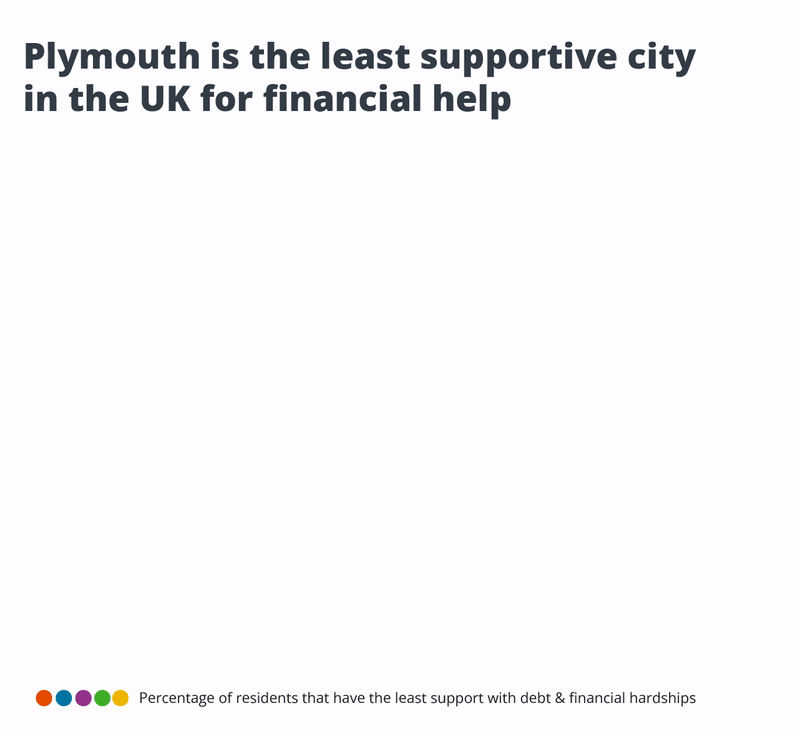
Those surveyed were given the option of selecting from a selection of cities across the UK so some respondents may have selected their nearest city.
When analysing the data for the least supportive cities in the UK for financial help, Plymouth ranked the worst with 35% of residents reporting a lack of support with money issues. Scottish cities Glasgow and Edinburgh follow with 31% and 30% respectively of residents also stating that they do not benefit from economic support.
Sheffield ranks 4th with 28%, followed closely by Manchester in 5th with 27% of locals lacking the support they need when it comes to their finances.

To understand the state of debt in the UK, our report has revealed the top 25 most common types of debt Brits face, as well as the average amount in 2023.
Credit Card debt is officially the most common type of debt that Brits face, with 43% reporting having had, or currently in this form of debt. In 2nd place on the list is overdraft debt, with 21% of Brits stating having been overdrawn.
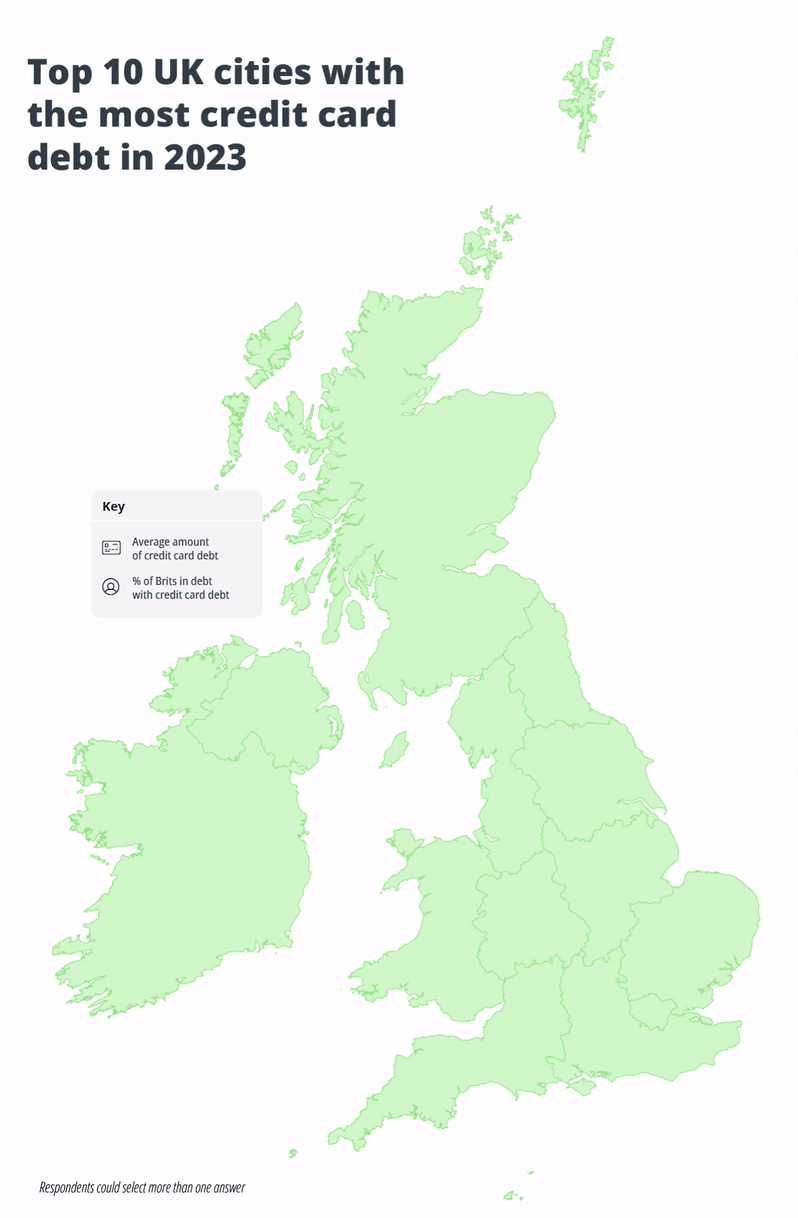
Those surveyed were given the option of selecting from a selection of cities across the UK so some respondents may have selected their nearest city.
With our survey revealing that almost half of Brits with debt are paying off their credit cards (43%), Equifax has analysed the UK cities with the most credit debt.
Our survey shows that people living in or close to Plymouth have the most credit card debt, with 69% of residents in debt stating they have on average £7,084 on their credit card.
Bristol, Southampton and Brighton follow, with over half of residents with debt in these cities reporting credit card debt (52% to 55%), with amounts ranging from £6,962 to £3,921 on average.
When looking into the cities with the most credit card debt, Leeds tops the list with the average credit card debt per resident totalling £9,650, which is £168 more than the average Londoner's credit card amount (£9,482).
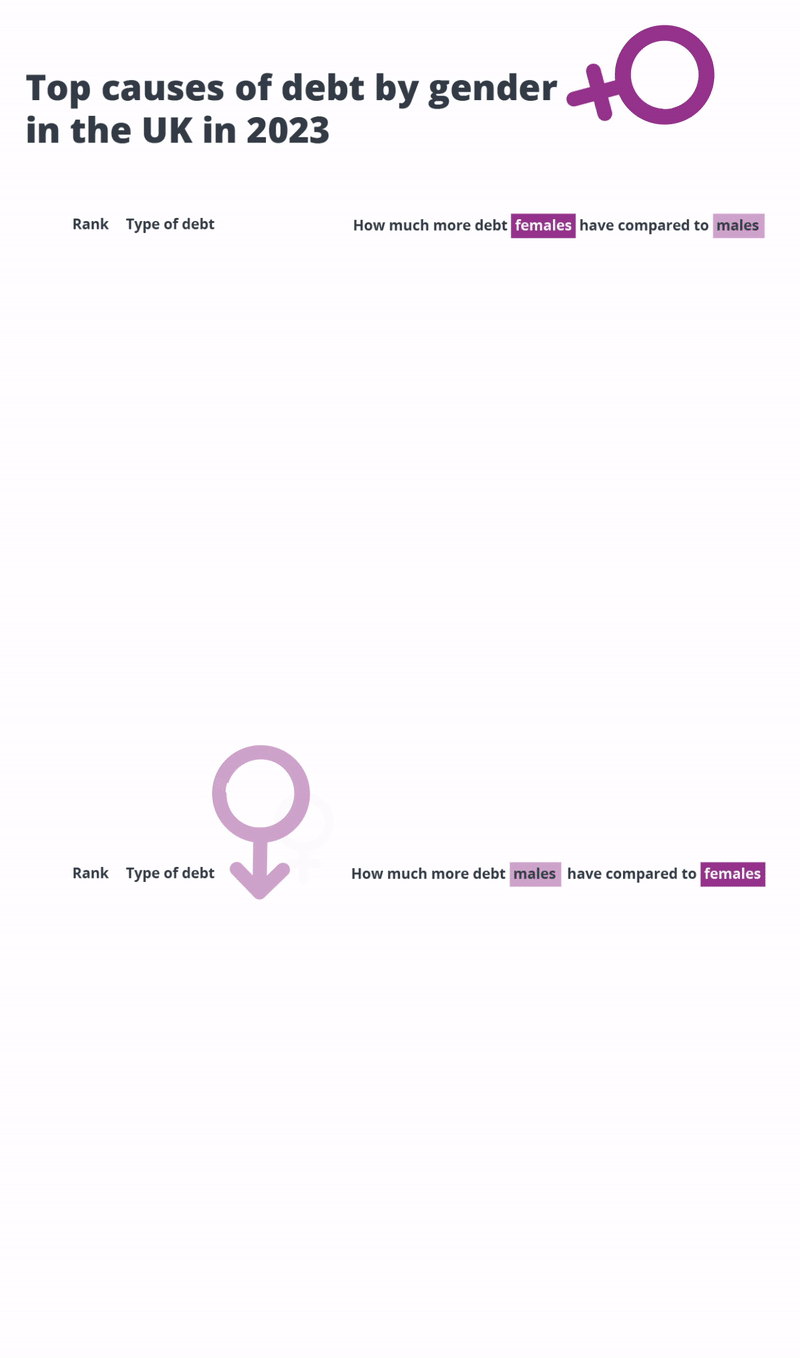
When it comes to analysing the gender debt gap, council tax ranks highest when it comes to women owing more than men - with 9% of women on average owing more in council tax than their male counterparts. Both student loan and credit card debt are tied second on the list with 8% of women having more debt than men in these means.
Conversely, the research also outlines that gambling is the most male-dominated form of debt, with males in 6% more debt than females. This is closely followed by debt that amounts through alcohol and drug use, which is 3% higher in men than in women.
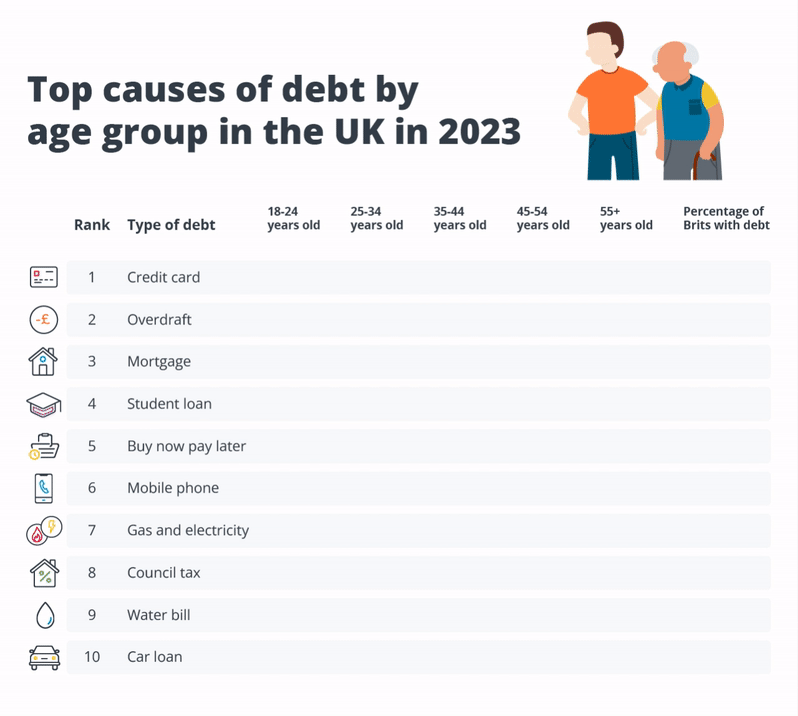
Student loan debt is confirmed as the top cause of debt amongst 18-24s in the UK with 28% in this age group having experienced this form of debt.
On the other hand, the most common cause of debt, credit card debt, follows an opposite trend with 68% of the 55+ age group reporting this form of debt - the highest result in the list. Credit card debt remains at the top spot as the greatest cause of debt amongst the 25-34, 35-44, 45-54 and 55+ age groups too, although this does decrease as the age group lowers.
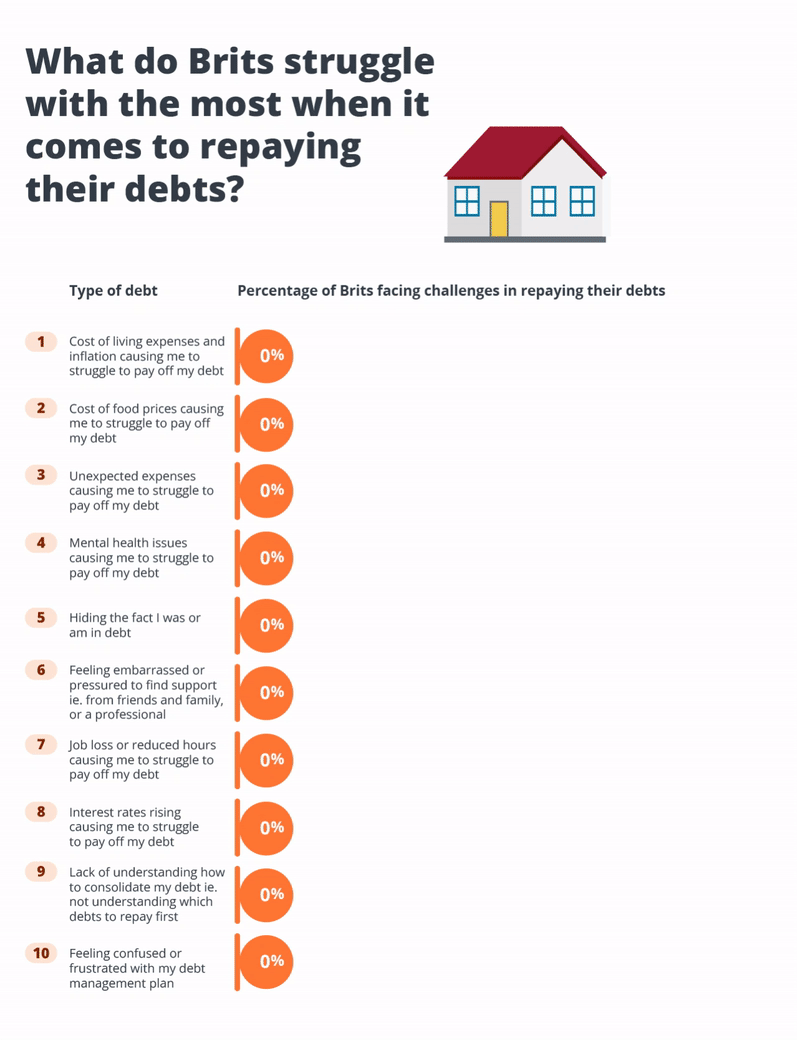
Our survey also asked Brits in debt what they struggle with the most when it comes to repayments, and the results show that the increasing costs in basic necessities coupled with inflation, increasing food prices and unexpected expenses are the top three major barriers to becoming debt-free. Over half of Brits (53%) believe that the cost of living crisis is the top major challenge for this.
Mental health issues and hiding debt also rank in the top 5 barriers to repaying debt in the UK, highlighting a clear issue to normalise debt and seek help.
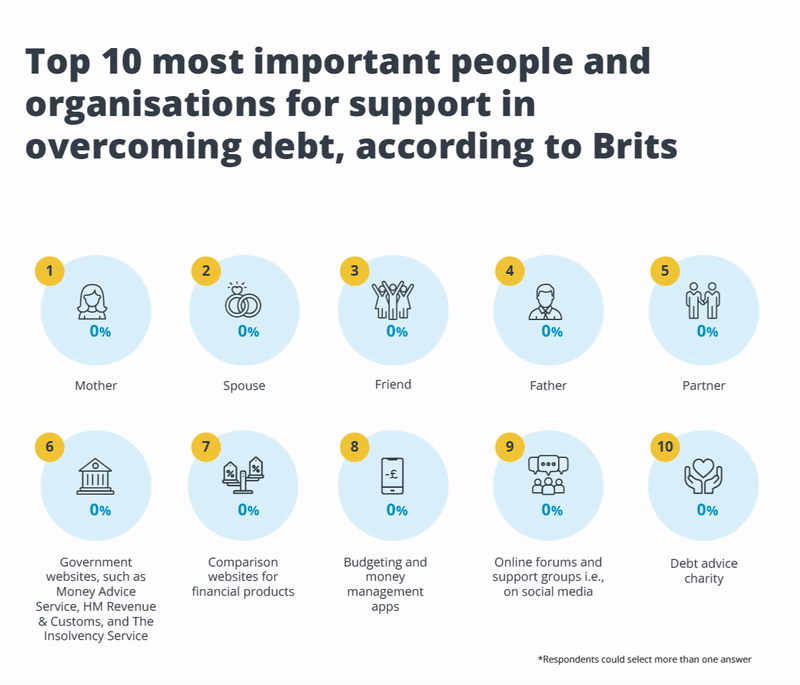
Receiving support from family, friends and organisations during difficult personal financial crises can be crucial in current times. We asked Brits which types of individuals and companies are the most helpful in terms of support based on experience.
Mums, spouses, and friends are among the most important financial advice and support figures according to Brits, with almost half of Brits agreeing (44% to 50%). Fathers, Partners, and government websites such as the Money Advice Service rank in the top 6 most helpful sources for advice with over a third of Brits in debt agreeing so (35% to 40%).
Of the top 10 most helpful individuals and organisations for Brits in debt, half of the list are people known to the individual (e.g. friends and family) and the other half are money advice companies - showcasing the importance of relying on both personal friends and family as well as professionals when managing debt.
How confident are Brits with debt when it comes to the future of repayments in 2023 and beyond?
Phil McGilvray, MD of Debt Services at Equifax comments “Our latest debt survey reveals that Brits face a lot of types of debt throughout a lifetime and that there are stark differences in the type and amount of debt depending on various factors including age, gender and location.
The good news is that according to our survey, 85% of Brits in debt feel or have felt confident in being able to repay all of their debts, with a quarter of Brits stating that they feel extremely confident in doing so (26%). However, this overall confidence in repaying slightly decreases for females (83%) in comparison to males (91%)”
Are the current government-run measures put in place enough to assist those with debt in the future?
“When asking Brits their opinions on the current debt-prevention measures put in place by local governments, the results reveal over a third of Brits believe that current policies aren’t effective enough (34%). Alongside this, only 7% of Brits think current measures are highly effective and well-implemented.
22% of Brits also are unaware of any measures put in place to help prevent those struggling with debt too, highlighting a clear issue to make those with debt more aware of available support”.
If you’re struggling with debt, ensure you seek free independent advice such as the Money Helper from the Citizens Advice Bureau.
This article was written on 07 December 2023; all information was correct at the time of writing.
Related Articles
- What happens to debt when you get divorced?
- Debt consolidation for secured and unsecured loans
- What is a Debt Management Plan (DMP) and will it help me pay my debts?
- Debt consolidation loans for bad credit
- Infographic: Is the UK’s household debt out of control?
- Marriage and bad debt
- How to get out of debt
- What is the IVA register?
- How does debt consolidation work?
- The bankruptcy register explained
- The CCJ register explained
- Hiding debts from your partner
- What is the insolvency register?
- Debt Relief Orders explained
- Good Debt vs Bad Debt: What's the Difference?
- How do IVAs work?
- How Bankruptcy Affects Your Credit Score
- Understanding CCJs